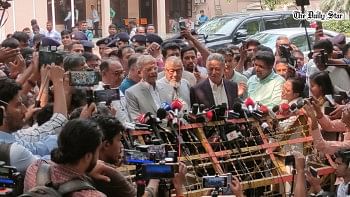A new era in US-Cuba relations
Cuba is only 90 miles from Florida. It is even closer than the US state of Hawaii. Although so close to each other, the diplomatic ties between the US and Cuba were frozen more than five decades ago.
Obama came to office with a simple message for his country's foes: "We will extend a hand if you are willing to unclench your fist." He believes that "engagement," combined with meeting core strategic needs, could serve American interests far better than endless sanctions and isolation. He believes that America, with its overwhelming power, needs to have the self-confidence to take some calculated risks to open important new possibilities in international relations.
Diplomacy is the first line of offense of the foreign policy of any country. President Obama understands better than most that diplomacy has always been important, if not vital, in dealing with the current dangerous and unpredictable world.
A hint of change in policy toward Cuba was first indicated on November 8, 2013 when President Barack Obama reportedly said at a fundraiser in Miami that it might be time for the United States to revise its policies toward Cuba. "We have to be creative and we have to be thoughtful, and we have to continue to update our policies," he said.
Thereafter in December 2013 the first handshake between President Obama and his counterpart Raul Castro of Cuba took place at the memorial service for Nelson Mandela in South Africa. A senior American official Edward Alex Lee of the US State Department insisted however that the handshake was not pre-arranged, but reflected what he called the "innate graciousness" of President Obama.
In December 2014, President Barack Obama and President Raúl Castro thanked Pope Francis for helping to broker a historic deal to begin normalising relations between the United States and Cuba, after 18 months of secret talks over prisoner releases brought a sudden end to decades of cold war hostility.
In December 17, 2014, U.S. Obama said the US and Cuba have chosen "to cut loose the shackles of the past", and Castro called for the embargo to end.
High-level diplomats from Cuba and the United States met in Havana in January 2015. While the talks did not produce a significant breakthrough, both sides described them as "productive", and Cuban Foreign Ministry official Josefina Vidal said further talks would be scheduled.
At the summit of the America in Panama, US Secretary of State John Kerry met with his Cuban counterpart Rodriguez on April 9 before an encounter between Obama and Castro.
A formal meeting between Obama and Castro took place in Panama on April 11 at the summit of the Americas and they shook hands in the first substantive face-to-face US- Cuba talks in more than 50 years.
President Castro reportedly said "In my opinion, Obama is an honest man … I admire him. I think his behaviour has a lot to do with his humble background, we are willing to discuss everything but we need to be patient, very patient," the Cuban president said to his counterpart in their first formal encounter.
Obama struck a more upbeat tone during what he called a "historic" meeting. "We are now in a position to move … toward the future," he said. "Over time, it is possible for us to turn the page and develop a new relationship between our two countries."
Though a formal end to the US trade embargo requires legislation in Congress, both Obama and Castro said they believed such executive action was sufficient to significantly open up relations between the two countries and allow travellers and trade to flow relatively freely.
On April 14 Obama informed the US Congress that he intended to remove Cuba from a US list of state sponsors of terrorism, clearing the main obstacle to restoring diplomatic relations and reopening embassies in each other's country. Moreover for Americans, Cuba would be an attractive tourist destination.
The thaw in relations with Cuba, however, brought fierce criticism from Congress, as many senior figures from both the main political parties believed that Obama struck a poor deal with few concrete commitments toward political reform from Havana.
"The White House has conceded everything and gained little in return," said Florida senator and Republican presidential hopeful Marco Rubio (Cuban roots). "We are getting no commitment on freedom of the speech, elections, no binding commitment on opening up the internet or even the semblance of a transition to democracy. This entire policy shift is based on a lie and illusion that more access to money and goods will translate to more political freedom."
In response to his critics, Obama reportedly said, "I'm not expecting a transformation of the Cuban society overnight. But we can't keep doing the same thing for five decades and expect a different result…We will continue to have strong differences, particularly on democracy and human rights ... but engagement is a better tool than isolation and nowhere is that more clear than Cuba."
Many analysts believe that for decades, American policy towards Cuba has been hijacked by a small cartel of politicos in Florida and their wealthy benefactors. Alan Gross, a long time American prisoner in Cuba reportedly said, 'Two wrongs don't make a right. I hope we can move on." He thinks that President Obama's decision is courageous, and long overdue.
The writer is Former Bangladesh Ambassador to the UN, Geneva.

 For all latest news, follow The Daily Star's Google News channel.
For all latest news, follow The Daily Star's Google News channel. 



Comments